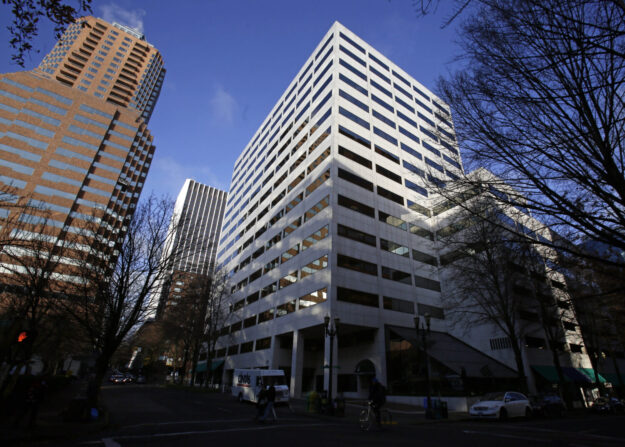Widgetized Section
Go to Admin » Appearance » Widgets » and move Gabfire Widget: Social into that MastheadOverlay zone
Proposed Colorado bill offers tax credits for converting offices into apartments

Businesses and individuals who want to convert commercial properties to at least half residential use would be eligible for a new tax credit under a proposed Colorado bill.
Nearly four years since the start of the COVID-19 pandemic, many office spaces, especially in cities like Denver, remain vacant as people continue to work remotely. And as those commercial real estate vacancies grow — and the property values drop — Colorado continues to confront its affordable housing shortage.
“A lot of this commercial space should, and can, be converted to residential space and meet our urgent need, which is the housing crisis across Colorado,” Democratic Rep. Alex Valdez of Denver said.
“This bill acts as a launching pad where we’d have the opportunity to see how to do this right and how to create housing in this time of desperate need,” he said.
Valdez is running the bill with Republican Rep. Matt Soper of Delta, Democratic Sen. Kevin Priola of Henderson and Democratic Sen. Jeff Bridges of Greenwood Village.
The bill would create a refundable tax credit of up to $3 million per project for costs associated with adaptive reuse, including elevator modifications, new windows, changing facades to meet environmental and insulation standards, and utility changes. Overall, the state Office of Economic Development wouldn’t be able to reserve more than $5 million of tax credits per year. In reality, the bill might benefit one project.
“I do think the tax credit is an important first step. The amount of it isn’t as important at this point, because I think of it more as a test case,” said Jennifer Ramsey, the adaptive reuse administrator for Denver.
Art Studios example
The bill would require the office to submit an annual report to the Legislature on the impact of the tax credit. That report would include the number of units that are affordable, though the tax credit itself does not have strict affordability requirements.
“This is all based on affordability, in the hopes that we can solve some of our housing affordability issues,” Valdez said. “But I think when you’re doing something innovative, you have to allow the private sector, in some sense, to define how they can deliver what we need — affordable housing — to a market.”
A recent example of conversion in Denver is the Art Studios building at 1200 Lincoln St., which opened last year after about $45 million in renovation costs. Developers converted the former Art Institute building into 192 residential units that range from $1,250 in rent for a 245-square-foot studio to $1,870 in rent for a 505-square-foot one bedroom.
The conversion idea is shared by Denver city leaders. A study released last summer identified 16 top candidates for adaptive reuse in Denver, which authors estimated could add over 5,000 housing units to the city. Researchers considered variables like transit availability, light and windows, the building’s shape, parking and the number of elevators.
Now, three projects are in the pipeline for a pilot program to help developers convert downtown office towers into apartments, according to Ramsey.
“By keeping some of these existing buildings, keeping the community uses and the character, making it a soft injection of higher density — from a city wide-perspective, it’s an excellent idea. Downtown, there’s immense potential,” she said.
Over 30% of office space in Denver sat vacant at the end of last year, according to reporting from the commercial real estate firm Newmark.
Costs for conversion projects can vary greatly, but experts say that it makes a lot more sense for some buildings than others. Prewar buildings, for example, are often narrower, have better light access and usually have functioning windows, said Tracy Hadden Loh, a Brookings Institution fellow who studies commercial real estate.
“You can convert anything if you try hard enough, right? It’s just that oftentimes it can get so expensive and complicated,” she said. “But the fact that the need is probably way bigger than $5 million does not mean that it’s not worth at least creating a structure to demonstrate how such a concept might work.”
Colorado lawmakers are considering a slew of housing policies this legislative session. That includes a bill to allow accessory dwelling units in the state’s largest cities, one that would make it more difficult for landlords to evict tenants and one to encourage high density development along transit corridors.
The bill faces its first test during a Feb. 29 committee hearing. The legislative session ends May 8. The tax credit bill has its first House committee hearing scheduled at the end of this month.
Editor’s note: This story first appeared on Colorado Newsline, which is part of States Newsroom, a network of news bureaus supported by grants and a coalition of donors as a 501c(3) public charity. Colorado Newsline maintains editorial independence. Contact Editor Quentin Young for questions: info@coloradonewsline.com. Follow Colorado Newsline on Facebook and Twitter.
Sara Wilson
Latest posts by Sara Wilson (see all)
- Immigrant rights groups push Colorado AG Weiser for probes into violations of ICE collaboration law - July 11, 2025
- Hurd, Boebert, Evans, Crank all vote to extend tax breaks, beef up ICE while slashing Medicaid - July 3, 2025
- Analysts warn that Colorado is facing billions in budget cuts if Trump bill passes - June 20, 2025


